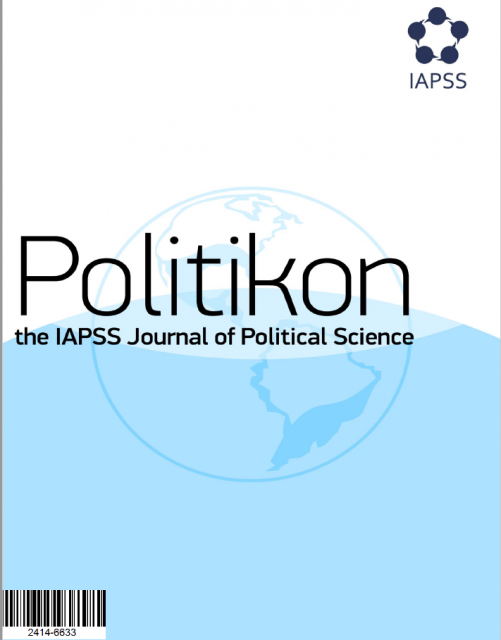Politikon
44
Publication date: Mar 2020
ISNN: 2414-6633
International Association for Political Science Students (IAPSS)


This issue can be symbolically divided into two sections. The first one features contributions from Jessica Nuske and Justinas Lingevicius. Nuske revisits the concept of representation in contemporary times when the ‘electoral connection’ between citizens and representatives alone is woefully inadequate to capture the complex relationship between these two subjects. Lingevicius, similarly to Nuske, departs from constructivist premises in his effort to make sense of the changes in Lithuanian foreign and security policy after the Crimean annexation. He reads the growing emphasis on Lithuanian independence in this discourse as an indicator that state identity in foreign policy can change due to relevant external events.
The second section focuses on African politics. Pieter Labuschagne studies new political parties in the South African party system, concluding that, in this respect at least, South African elections does not identify significant differences compared to ‘consolidated democracies’. Thomas Ibrahim Okinda, Benson Oduor Ojwang, and Charles Ongadi Nyambuga use survey data from female voters in one of the counties for the Kenyan general elections to investigate how socio-democratic and attitudinal variables correlate with their electoral participation. Their findings argue in favour of female electoral participation facilitating gender equality in general. The study of the relationship between election management systems and peaceful alternation of power in Ghana and Nigeria by Harrison Adewale Idowu and N. Oluwafemi ‘Femi’ Mimiko is a qualitative explorative analysis arguing that the credibility of the election management system has been conducive to the peaceful alternation of power in Ghana while other factors facilitated the same outcome in Nigeria. Finally, Idris Buta reviews the book 'Violence in African Elections', praising it for its scope as well as the capacity to recognise the uneven distribution of electoral violence across the cases studied, but highlighting the need for more recommendations focused towards domestic rather than international actors in eliminating electoral violence.
Content
Articles
Who gets to judge? Approaching non-elected representative claims from constructivist interest-group theory by Jessica Nuske
Identity Discourse within a Geopolitical Crisis. The Case of Lithuania by Justinas Lingevicius
The Dichotomy Between Large and Small Political Parties. A New Perspective on Electoral Volatility in South Africa by Pieter Labuschagne
Sociodemographic Characteristics and Political Attitudes as Correlates of Women Voters’ Electoral Participation in Counties in Kenya. The Case of 2013 Polls by Thomas Ibrahim Okinda, Benson Oduor Ojwang, Charles Ongadi Nyambuga
Election Management Systems and Peaceful Alternation of Power between Incumbent and Opposition Governments in Ghana and Nigeria by Harrison Adewale Idowu, N. Oluwafemi ‘Femi’ Mimiko
Book reviews
Violence in African Elections: Between Democracy and Big Man Politics
Edited by Mimmi Söderberg Kovacs, Jesper Bjarnesen, Idris Buta











